

Perma'map - l'univers de la permaculture. Seven Generations. World One People Too. Appreciative Inquiry AI Practitioner Homepage. A Labor of Love: The Dhyanalinga Dome. Question Sadhguru, why is the Dhyanalinga encased in the shape of a dome?
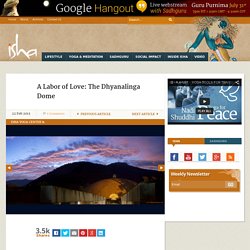
Is there any scientific reason? BEFORE THEY PASS AWAY. Com.post.ability. National Parks. WORLD VIEWS. WORLD VIEWS. Emerging Trends. Earth Scientia. Earth Paradigm. The WaterWheel — Wello Water. In September 2011, the Wello team arrived in India with the goal of answering one big question:

Eco Agriculture Activity Nexus. ASBH Home Page. Plants For A Future : 7000 Edible, Medicinal & Useful Plants. Home - Functional Ecology. Foundation For Deep Ecology. Frontiers in Ecology and the Environment. Iale: Home Landscape Ecology. From brick and mortar shops to city planning, we cover sustainable trends in construction, renovation, and more.
The Society for Human Ecology. The Institute for Social Ecology. Dutch kids have a different relationship to the bicycle. Why the Dutch don't wear helmets. One of the perennial topics of controversy in the bicycling community is helmets, and the controversial issue is not about which color is prettiest.
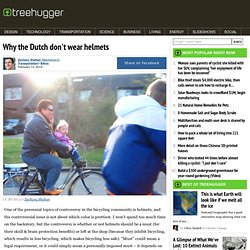
I won't spend too much time on the backstory, but the controversy is whether or not helmets should be a must (for their skull & brain protection benefits) or left at the shop (because they inhibit bicycling, which results in less bicycling, which makes bicycling less safe). "Must" could mean a legal requirement, or it could simply mean a personally imposed must – it depends on the conversation. I used to be the director of a nonprofit that was primarily focused on promoting and supporting bicycling in the greater Charlottesville area. I remember publishing the picture that I've used at the top of this article on the front of one of our newsletters and subsequently getting chewed out by some of our members.
First of all, I'll start with the question that got the conversation started: "Why the lack of helmets? Civic Ecology Lab, Cornell University. Resilience Alliance - HOME. Survival International - The movement for tribal peoples. Urban Ecology. Mission statement Vibrant neighborhoods are the building blocks of healthy cities and thriving regions.
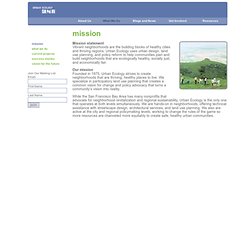
Urban Ecology uses urban design, land use planning, and policy reform to help communities plan and build neighborhoods that are ecologically healthy, socially just, and economically fair. Our mission Founded in 1975, Urban Ecology strives to create neighborhoods that are thriving, healthy places to live. We specialize in participatory land use planning that creates a common vision for change and policy advocacy that turns a community’s vision into reality. While the San Francisco Bay Area has many nonprofits that advocate for neighborhood revitalization and regional sustainability, Urban Ecology is the only one that operates at both levels simultaneously. Practical Action - technology challenging poverty. Latin America In Peru and Bolivia, we help communities set up small-scale technological solutions in remote areas where there is no access to basic services, including electricity, heating, clean water and sanitation.
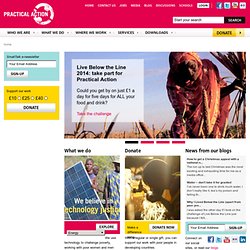
Western Africa Building on our recent extension of consultancy work into west Africa, Practical Action has recently set up an office to deliver impact at scale in Francophone west Africa. Eastern Africa. Institute of Urban Ecology. New Ecology, Inc. File:Canon law relationship chart.svg. Cancel Edit Delete Preview revert Text of the note (may include Wiki markup) Could not save your note (edit conflict or other problem).
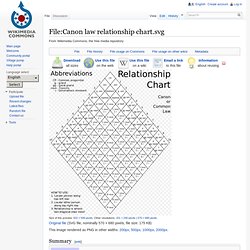
Please copy the text in the edit box below and insert it manually by editing this page. Rare Breeds Survival Trust. The Rare Breeds Survival Trust (RBST) is a conservation charity,[1] whose purpose is to secure the continued existence and viability of the United Kingdom’s native farm animal genetic resources (FAnGR).
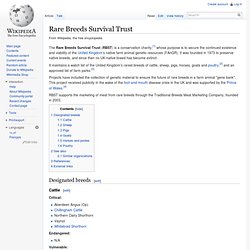
It was founded in 1973 to preserve native breeds, and since then no UK-native breed has become extinct. It maintains a watch list of the United Kingdom's rarest breeds of cattle, sheep, pigs, horses, goats and poultry,[2] and an approved list of farm parks.[3] Projects have included the collection of genetic material to ensure the future of rare breeds in a farm animal "gene bank". This project received publicity in the wake of the foot-and-mouth disease crisis in the UK and was supported by the Prince of Wales.[4] RBST supports the marketing of meat from rare breeds through the Traditional Breeds Meat Marketing Company, founded in 2003.
Designated breeds[edit] Cattle[edit] Critical: Resurrecting the Dodo and Other Extinct Creatures" Though some experts contend that it will never be possible, a great debate is underway in science about whether it's ethical to bring an extinct species back to life.
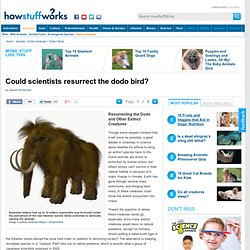
Some animals are driven to extinction by human action, but others simply can't survive in their natural habitat or because of a major change in climate. Environmental Working Group. As You Sow: Corporate Social Responsibility, Shareholder Advocacy and Toxics Reduction. Ethical Sourcing at Life Without Plastic - Green America Certification - Product Testing - Environmental and Labor Standards. Portal:Sustainable development.
Neo Eco Ethica. Eco Ontology. Eco Solutions. Land Water BioMass. Complex Systems.